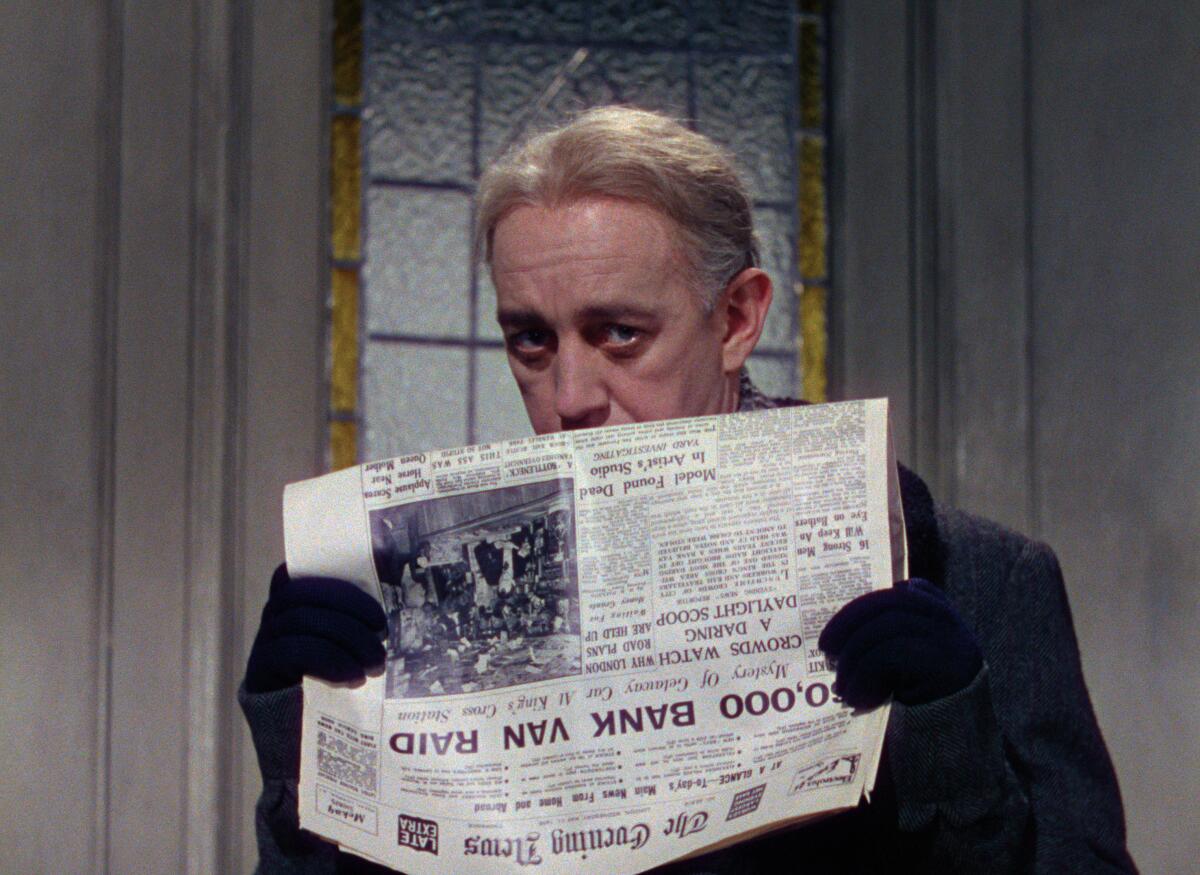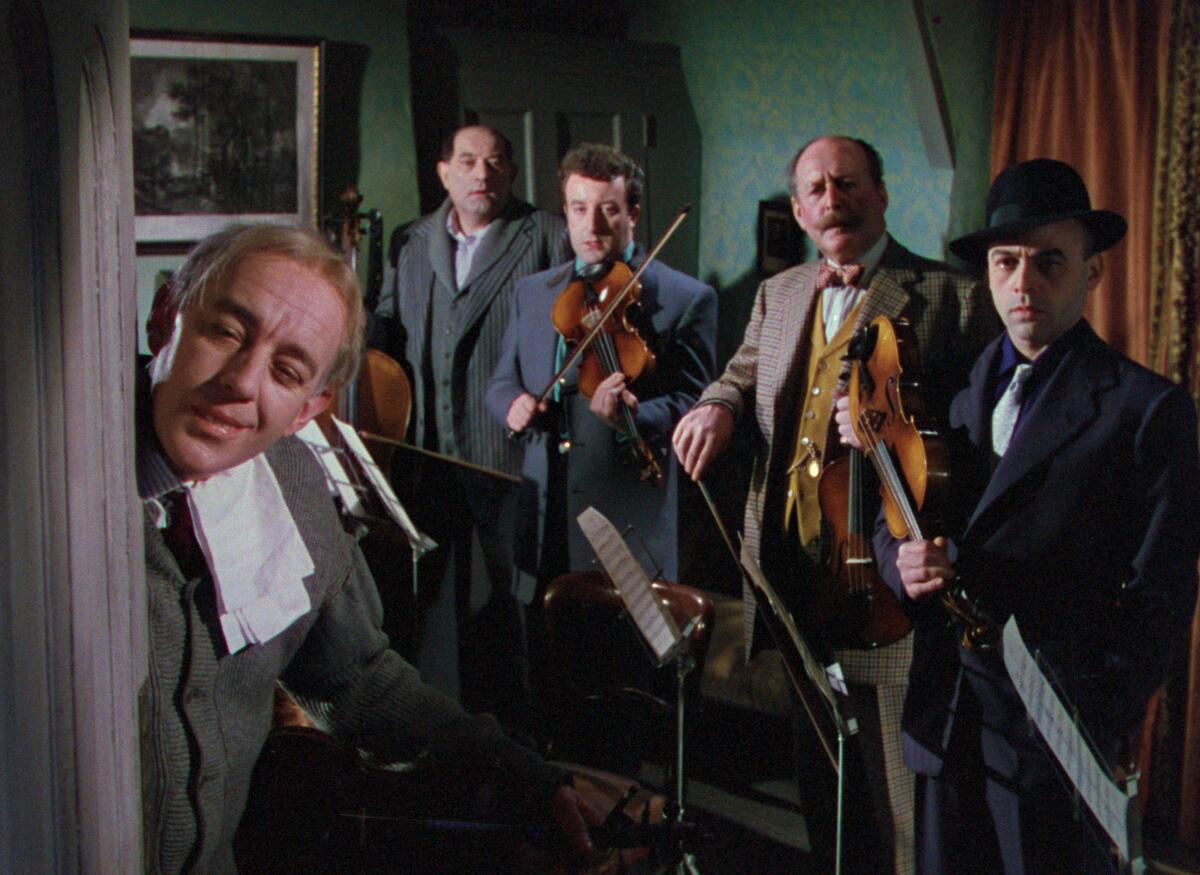Review: Put on your crooked smiles for the Ealing original ‘The Ladykillers’

The Times is committed to reviewing theatrical film releases during the COVID-19 pandemic. Because moviegoing carries risks during this time, we remind readers to follow health and safety guidelines as outlined by the Centers for Disease Control and Prevention and local health officials.
Whether or not “The Ladykillers” star Alec Guinness was fully aware of how horrifically funny his grotesque false teeth would come across when projected on massive movie screens after this last great Ealing Studios comedy reached theaters in 1955, the illustrious British actor’s choice of choppers was nevertheless one for the ages. To my mind, they belong right alongside Marlon Brando’s Don Vito cotton clumps and whatever is on the lower half of Immortan Joe’s face in “Mad Max: Fury Road” in the pantheon of movie mouth enhancements.
As criminal mastermind Professor Marcus, leader of a gang preparing for a cunning heist with one unwitting participant, Guinness’ askew, oddly-spaced grin — like a row of stained, upside-down tombstones augmenting his every dirty conspiratorial giggle or dryly manipulative threat — is a perfect metaphor for the off-kilter allure of this most drolly deadly of English film farces. Having survived the ignominy of a terrible Coen brothers remake (itself like some ill-conceived theft), director Alexander Mackendrick’s and screenwriter William Rose’s original creation can now be seen again in the dark of cinemas, its three-strip Technicolor vision of manners and menace lovingly restored.
There is, as far as I can ascertain, no such designation as the ECU (Ealing Cinematic Universe), but in the late ’40s and ’50s the legendary British movie studio’s fans could have told you what tied together so many of their most beloved releases (“Passport to Pimlico,” “Whiskey Galore,” “The Man in the White Suit”): English tradition in the postwar years treated as admirably tireless, warmly clever and eminently satirizable. Think Hollywood after the Great Depression, when romanticizing and lampooning the filthy rich gave us that uniquely American genre, the screwball comedy.

In “The Ladykillers,” that figure of carry-on pluck is elderly Mrs. Wilberforce, well-known to the police station for her innocuous tales of imagined nefariousness, and played by eventual BAFTA winner Katie Johnson with all the absent-minded naivete of a grandmother who’d wandered onto the set of a horror film. Part of that set, however, would be this widowed character’s own creakily cozy, lavender-and-lace Victorian house, situated at the end of an unassuming street but fronting a precipitous rail bridge. When cinematographer Otto Heller offers up a stark overhead view in tandem with Tristram Cary’s impishly ominous score, it comically suggests the kind of Gothic location best left alone by visitors.
And yet Guinness’ sallow-faced, toothy fiend sees nothing more inside the fusty walls than a sweet, harmless inhabitant whose room to rent provides the ideal cover for a scheme requiring he and his men — including a sleekly sinister Herbert Lom and a doughy Peter Sellers before they’d tussle on the other side of the law in the Pink Panther films — to pretend they’re a traveling string quartet. But why, Professor Marcus muses aloud to his hoped-for landlady, do the pictures not hang evenly? Wartime bombing, Mrs. Wilberforce calmly explains. In Guinness’ hilariously off-handed assessment of what he now realizes is a structurally sound but forever lopsided house — “Charming” — could a million Ealing comedies bloom.
What follows is the ultimate fractured fairy tale, one in which a first act robbery is directed with all the cross-cutting suspense of a Hitchcock film, while the second act crumbling into multiple murders is the height of farce. Though Rose claims to have pulled the black-as-coal plot of his Oscar-nominated “The Ladykillers” screenplay fully formed from a dream, the story’s central gag — that a suspiciously disruptive horde prove no match for one defiant little old lady — has been interpreted beyond its surface poke at Englishness, as an of-its-time commentary on Labor’s struggle in an uneasy postwar Britain to wrest control from old world Conservatives.
But one need not know any of that to enjoy the skillful commingling of the macabre and the genteel on display — character humor, cinema style, and tonal audacity in synch like few other comedies have ever achieved. Crooked smiles guaranteed.
'The Ladykillers'
Not rated
Running time: 1 hour, 31 minutes
Playing: Starts July 2, Laemmle Royal, West L.A.; Laemmle Town Center, Encino; Laemmle Playhouse 7, Pasadena
More to Read
Only good movies
Get the Indie Focus newsletter, Mark Olsen's weekly guide to the world of cinema.
You may occasionally receive promotional content from the Los Angeles Times.







